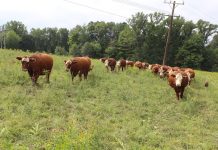“In going over my farm records, I note a large increase in the cost of labor, fertilizers, crate material, horses, wagons and travel expense.”
— Delbert Utter, 1912
Among the books in my small but growing library stands a tiny publication titled Making Special Crops Pay by Delbert Utter.
Its publication date is 1913, and was considered a practical reference for farmers of that time. The inside cover page reads, “The author is a very successful Wisconsin farmer who formerly conducted a general farm, with grain the chief crop. He saw the need of growing other crops to increase the income, and from a small beginning with a half-acre of sweet corn, he has built up a large business growing a few special crops for a market 20 miles away.”
In his introductory remarks of the book, he points out that some, in looking for the “pot of gold” have moved their families to the Everglades of Florida, the Panhandle of Texas, or the orchard country of the mountain regions, or the great Northwest, where wheat is grown by the section, instead of by the acre.
The author felt that farmers were often being led astray by “agents promoting the sale of lands owned by speculators” who paint word pictures that “coax the money away from many who are anxious to better their financial condition.”
Waste acres
He urged young farmers to consider developing the “waste acres of our home farms” which would allow them to remain in a country where social and educational conditions “are established and favorable.”
The “waste acres” to which Utter referred might be land which could be made more productive with intensive methods of cultivation or by breeding a better grade of livestock.
“Few acres and more per acre” was a motto that the author said should be written down and hung on the wall.
He writes, “The farmers’ sons of today realize that the opportunities of acquiring large farms are few and far between, and if they wish to remain on the land and prosper they must adopt some system of small crop farming.”
New things
The author tells of coming in to 80 acres upon the division of the home farm. He had been trained in growing grain and breeding sheep for wool production, but suddenly realized he must grow crops that would produce more income than ordinary farm crops. He decided to try early potatoes and sweet corn, and within a few years, those crops were “the headliners, the dairy and other crops becoming of secondary importance.”
He describes using glass to create a “hotbed” in order to get early crops out to the hungry. He discusses using only the best seed, the healthiest, most stable manure for fertilizer, and nitrate of soda with potash which can make an average crop flourish.
He closes chapter 2 by saying, “Success still depends upon the man. The successful farmer must be a business man. He must be alive to the possibilities of his occupation, ready to take advantage of every opportunity possible to increase his sales. By correspondence, use of the telephone and personal inquiry, he must be able to place his products where he will receive the best price. He must be able to handle men, for he must employ much help. He needs to be a hustler, for his crops must be marketed at the right time and at the right place.”
The author was an older man at the time of this writing, and he draws upon many years of farming experience. His wisdom jumps off the page, making one think that much of what he has to say can be applied to the present day.












